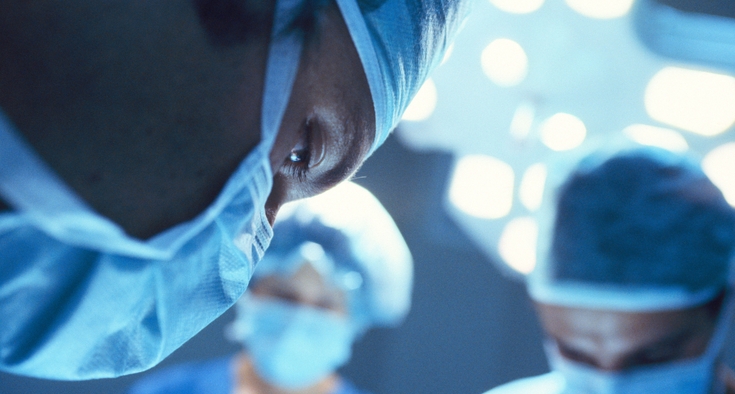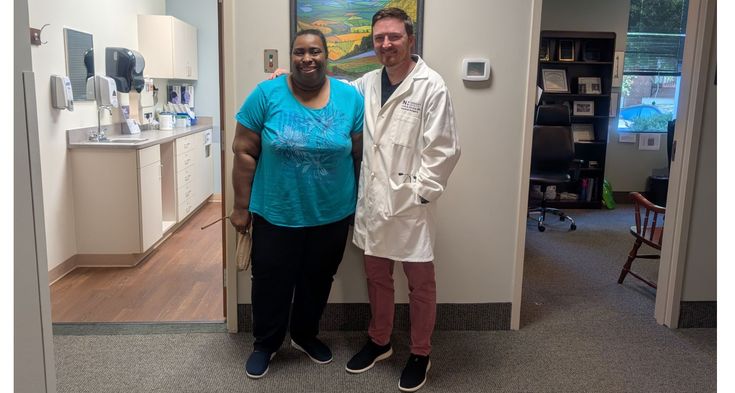Obesity increases risk of developing a number of health conditions, from high blood pressure to type 2 diabetes to joint problems.
In this episode, we sit down with Dr. Colston Edgerton, a bariatric surgeon at Novant Health General Surgery & Bariatrics - Wilmington, who discusses the various types of bariatric procedures, the lifestyle changes that accompany them and how they can improve overall health.
Expert, empathetic weight-loss care awaits
Maggie McKay (Host): Meaningful Medicine is a Novant Health podcast, bringing you access to leading doctors who answer questions they wish you would ask. From routine care to rare conditions, our physicians offer tips to navigate medical decisions and build a healthier future. Today, I'm sitting down with Dr. Colston Edgerton, and we're going to be discussing the benefits of weight loss surgery.
Before we get started, I'd love to know how surgery became a passion of yours.
Dr. Colston Edgerton: Thank you, Maggie, for having me. To start out with, I was really drawn to surgery when I had a life changing surgery myself when I was in high school. I recovered well and it had a profound impact on my life and I was able to see the bedside manner that my surgeon had and his commitment to my care. And it was a very motivating experience for me.
Host: So that is basically what made you focus on bariatric surgery?
Dr. Colston Edgerton: Well, it wasn't really until I was a surgery resident and I got exposed to the field of bariatric or metabolic surgery, and really was able to see the impact that it had on people's lives in many different ways. So it wasn't just the weight loss, but it was how people had their medical conditions treated.
You know, their diabetes got better, their acid reflux got better. And that really, was a profound way to impact someone's life. And I became very interested in it at that time.
Host: So what are the different types of bariatric surgeries available, and how do you decide which one will work best for your patient?
Dr. Colston Edgerton: Sure. There's essentially three surgeries that we do now. The first is the sleeve gastrectomy, which has become the most common bariatric surgery performed in the United States. There's the gastric bypass, and then a fairly newer procedure, the duodenal switch, or the SADI. Each of these procedures has its pros and cons and certain indications.
When we meet with a patient for the first time, we go over their specific history and which of the three surgeries that we think that they would benefit from the most. Sometimes it's because of certain medical conditions that they have. Sometimes it's because of how much weight loss we want to target. And ultimately, we recommend which of those surgeries would be best for each specific patient.
Host: You touched on this a little bit, but will this change their overall life and improve other health conditions they may be facing?
Dr. Colston Edgerton: Absolutely. And that, for a lot of patients, is the most exciting part of the surgery. So I think some people are drawn to the idea of bariatric surgery because they think of it as weight loss surgery. But many of our patients are actually referred by their medical doctors to address things like diabetes and hypertension.
We now have good long-term data and studies that have shown that compared to the best medical therapy available, that bariatric surgery is more capable of treating and curing things like diabetes, high blood pressure, things that can make up what's termed metabolic syndrome. We have even more data to suggest that other cardiovascular risk factors, like the risk of having a heart attack or stroke, is also decreased after having this surgery.
And then another exciting thing that we've seen is that certain hormone sensitive cancers actually have a lower incidence in patients after they have had bariatric surgery compared to similar or matched patients who have not had surgery. So for those reasons, we often tell patients that we think that this is one of the best things that they can do for their overall health and that the weight loss is kind of an exciting thing that goes along with all those health benefits.
Host: That's amazing. If surgery is the most appropriate option, what does a patient have to do to prep for it?
Dr. Colston Edgerton: Bariatric surgery is very well regulated by our national society, the American Society for Metabolic and Bariatric Surgery. And, we've set out a lot of standards of care that allows every patient to go through a similar preoperative workup and screening process. Two of the important things are that they have a mandatory meeting with a dietician to talk about what the preoperative preparation before bariatric surgery is. And also the postoperative expectations in terms of progressing along a diet and kind of how to get used to the way that they should be eating after surgery.
Another preoperative requirement is they meet with a provider for a psychologic evaluation to make sure that they're kind of mentally and emotionally ready for surgery.
Once we do things like that, we submit all those assessments, then also notes from their primary care physician to the insurance company to make sure that the surgery is approved and that we can go ahead and schedule a procedure for them.
Host: So there is a little bit of prep on the patient's end.
Dr. Colston Edgerton: There is and sometimes I just say that, you know, patients are very excited to go ahead and rush into surgery, and for some people that don't have other requirements from their insurance providers, it can be a fairly quick process, but I do think that it's good to kind of level the playing field for every patient and make sure that they've had that assessment and counseling from a dietician; so that they're as prepared going into surgery as they need to be so that they'll have a successful outcome afterward.
Host: Absolutely. Speaking of the outcome, what does recovery look like for your patients? What can they eat or drink post surgery?
Dr. Colston Edgerton: The recovery from an activity and you know pain tolerance standpoint is fairly quick. We do all of these surgeries minimally invasive with a camera and small instruments. So you know, traditionally it was more kind of laparoscopy. We're doing more of these surgeries robotically, but similar minimally invasive surgery principles.
And so that allows patients to be up and moving the day of surgery. We want them walking, going up and down stairs, things like that, that allow them to have a quicker recovery. As you alluded to, one of the kind of biggest changes after surgery is a progression along a diet. So we kind of start out just focusing on liquids, and then we transition to soft food for about a month after surgery, to make sure that they're staying hydrated and that they're getting enough protein in.
We see patients back with routine postoperative follow up to make sure that they're tolerating that diet well, and then we transition back to solid food. So, those are the things that we go over with the dietician, and also make sure that they're prepared for after the surgery. But generally speaking, most patients tolerate that transition fairly well, and for some, it's almost a welcome change where they don't maybe feel as hungry as they did before. They don't, you know, they feel full quicker. And those are, are almost kind of a pleasant relief to kind of have their changes in their anatomy cause those types of physiologic changes.
Host: Well, surgery, it sounds like, accompanies a healthier lifestyle. So do you help your patients come up with a healthy diet and exercise routine, or is there a dietician you work with?
Dr. Colston Edgerton: Yeah. So there are dieticians that we work with that can specifically help patients with some of those lifestyle changes. And that's one thing that I'm sure to tell all of my patients before surgery is that the folks that might lose the most weight and keep the most weight off after surgery are people that see this as one step of a lifestyle change, right?
Surgery itself is going to allow them to lose weight and keep it off in a way that just diets and exercise routines alone have been unable to help the patient do that in the past. You know, many of our patients have tried all kinds of things in the past, maybe have lost some weight for a period of time, but then have gained it back.
And the unique thing about combining surgery with all of that is that, is that it changes people's anatomy and kind of their metabolism, their metabolic set point to a point where their body is now expecting to be kind of at a lower weight, and has their metabolism changed as a result.
But it's still important to incorporate all of the healthy lifestyle changes. They can give them the best result possible. So, as you mentioned, exercise is a key thing, but also not just eating maybe smaller amounts at each meal, but thinking about what you're eating, you know, that it's not very calorie dense and things like that.
So, we really encourage patients to have their family members be supportive of this, so those, you know, people who are preparing food at home, that they can incorporate some of those healthy lifestyle suggestions.
Host: And I imagine you would kind of need a support group after going through this or some other resources. Can you recommend what you tell your patients who have undergone bariatric surgery to do post-surgery as far as support groups maybe?
Dr. Colston Edgerton: Yeah, absolutely. As I alluded to, the first thing is to make sure that their family is supportive of this, to make sure that they understand, you know, kind of why they're interested in surgery and what some of the recommendations for after the procedure are. I caution people that there's a lot of things on the internet, so you can kind of hear any and everything that you want to find, in terms of different advice that everybody has.
But it's also a very powerful tool in a very broad community of patients that have gone through similar things. And we do find that a lot of our patients really enjoy networking with other people that have had bariatric surgery to hear about what their experience is, to share with their successes.
As I mentioned before, our National Society mandates certain requirements before and after surgery. And one of those is to actually participate in a support group before surgery. So our hospital has a monthly virtual meeting that the patients can choose to participate in that community and support group.
Host: Isn't that great? Just think like even 20 years ago before Zoom, you know, you probably felt so alone unless you went to a physical support group.
Dr. Colston Edgerton: That's right. And what we find is that a lot of our patients will show up for their first appointment and they're already very well informed. They already know exactly what questions to ask, you know have been talking to friends or family members. And I think it's not just kind of the virtual community that we see, but studies have shown that obesity is trending upwards in our country, and there's a higher percentage of our population that meets these criteria for surgery.
And so, as a result, over the years, people tend to know more, more friends and family members that have had bariatric surgery, have seen their successes, and sometimes that's the first thing that makes them a little bit interested in pursuing it
Host: And it does sound like it's very successful. The people I know who have done it kept the weight off forever. So what kinds of results can be expected post surgery?
Dr. Colston Edgerton: Sure, and that's one of the biggest proponents of surgery is that we have long term data on the results of these procedures. You know, 5, 10, 15, even 20 year plus data on the outcomes. And so we think of things in terms of excess body weight, so how much you weigh over an ideal body weight. We kind of think of things in terms of body mass index, which is a ratio of your weight and your height. How much you weigh above an ideal BMI of 25. And so after surgery, we see folks can lose anywhere from 65 to even 80 percent of their excess body weight, depending on which of those three procedures they end up having. But across the board, we do find that those percentages and the weight loss that people experience, far surpass any known studies for lifestyle and diet changes alone.
And even there's a lot of discussion about some of the weight loss medications, the injectable medications like Wegovy and Ozempic. They have moderate weight loss early on, but the long term data is not as clear in terms of how long that weight loss is sustained for, especially after they come off the medication.
So that's kind of the big difference once we're actually changing someone's anatomy, how durable those results are.
Host: And in closing, is there anything else you'd like to add that we didn't cover?
Dr. Colston Edgerton: It's just, you know, a lot of what we've kind of touched on how these procedures can impact people's lives. And like I said, that was one thing that really drew me to the field was to see not only did it help somebody lose weight, but how much it can impact their medical conditions. And then even the weight loss alone, I think that unlike a lot of different fields of surgery that might deal with, you know, repairing a hernia or taking your gallbladder out, weight loss really does impact people's lives in a lot of different ways, you know, socially, how they interact with friends and colleagues and professional and work considerations.
And so it's not uncommon that we would have patients come into our office, you know, months or years after their surgery and say that it's the best decision that they had ever made and they just wish that they had thought about it sooner. It's really a privilege to work with patients, not just to do the surgery and never see or hear from them again, but to follow them over time and really see that transformation that can happen in their lives.
Host: I bet. Well, thank you so much for sharing your expertise. This has been so educational and helpful.
Dr. Colston Edgerton: Absolutely, happy to be here.
Host: Again, that's Dr. Colston Edgerton. To find a physician, visit NovantHealth.org. For more health and wellness information from our experts, visit HealthyHeadlines.org. And if you found this podcast helpful, please share it on your social channels and check out our entire podcast library for topics of interest to you.
I'm Maggie McKay. Thanks for listening to Meaningful Medicine from Novant Health.








